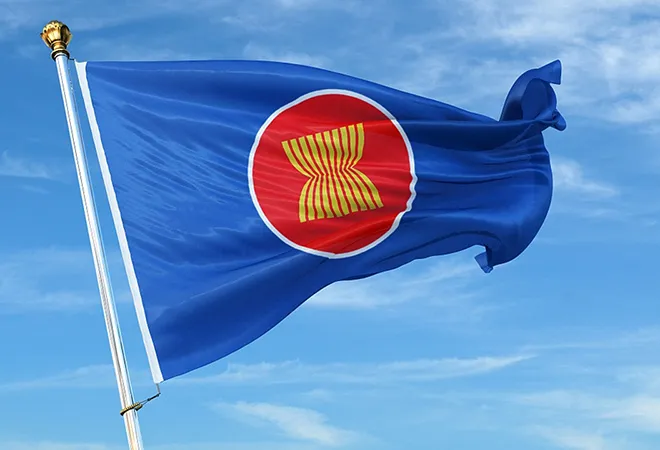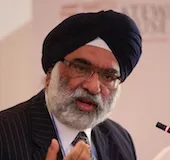-
CENTRES
Progammes & Centres
Location
The EAMF is fighting for space in an already crowded and complicated geopolitical context and geography

Maritime issues are at the fulcrum of discussion for Association of Southeast Asian Nations (ASEAN) in its exchanges with India, and the Quad and East Asia Summit (EAS) members. ASEAN has a preponderance of maritime space, an interest in the UNCLOS, and faces serious issues in the South China Sea (SCS). It guards its centrality, for which it has ASEAN-centric institutions like the ASEAN+1, Asean Regional Forum (ARF), the East Asia Summit (EAS) and the Asean Defence Ministers Meeting plus (ADMM+). In its initial years, it was relatively easier for ASEAN to seek centrality in a region settling down after the Vietnam War and later the end of the Cold War. For a decade now, ASEAN’s central role in the region has been challenged by major powers’ activity rather than being determined by ASEAN ability. Several plurilateral arrangements have also emerged in the region.
Maritime security was initially brought up as a major concern at the ASEAN Regional Forum (ARF), which sought comprehensive guidelines for maritime security. Thereafter, the Bali Concord II in 2003 dealt with maritime security as a wider ASEAN issue. Regional cooperation had started with various efforts including the ‘Eyes in the Sky’, part of the Malacca Straits Security Initiative in 2005. This led to the establishment of the ASEAN Maritime Forum (AMF) in 2010 and the Expanded ASEAN Maritime Forum (EAMF) in 2012. The EAMF is the youngest of the ASEAN-centric institutions.
Maritime security was initially brought up as a major concern at the ASEAN Regional Forum (ARF), which sought comprehensive guidelines for maritime security.
Regional partners contributed in various ways including to the Regional Cooperation Agreement on Combating Piracy and Armed Robbery against Ships in Asia (ReCAAP) in 2006. This was the first regional inter-governmental agreement to promote cooperation against piracy and maritime armed robbery in Asia.
At the EAS in November 2011, Japan proposed to establish a forum to discuss maritime cooperation amongst the EAS member countries. The ASEAN concurred and the first EAMF took place in October 2012, back-to-back with the AMF. Since then, the EAMF has been held, with participation of EAS member countries and experts, as a Track 1.5 forum.
The 1st Expanded ASEAN Maritime Forum was held in Manila, Philippines, on 5 October 2012. It was chaired by Erlinda F. Basilio, Undersecretary for Policy of the Department of Foreign Affairs of the Philippines alongside the 3rd AMF. It was attended by government and non-government delegates from the EAS countries, namely, the ten ASEAN Member States, Australia, China, India, Japan, New Zealand, Republic of Korea (ROK), Russian Federation, and the United States (US) along with the ASEAN Secretariat.
The ASEAN and EAS leaders were enthused to start discussions so that opportunities to address common challenges relating to maritime issues in the region could be grasped. The EAMF was to build upon the AMF and, thus, the EAMF is another body with ASEAN centrality.
The EAMF was seen as track 1.5 diplomacy with cross-cutting maritime issues that concerned all the EAS countries. The focus of the first meeting was on the importance of the UNCLOS in the current context; maritime connectivity with attendant capacity building; infrastructure upgradation; training for seafarers, of which several ASEAN countries and India, in particular, had a very large number; protection of the marine environment; and promoting fishery regimes; besides identifying best practices for cooperation.
On the relevance of the UNCLOS, maritime connectivity, and protecting the marine environment and fisheries, there were various interventions by both EAS and ASEAN members, and each one focused on cooperation based on existing documents and institutions, including the Treaty of Amity and Cooperation in Southeast Asia, The Declaration on the Conduct of Parties in the South China Sea, amongst others. The main thought leadership was from Singapore, the US, Australia, ROK, Japan, New Zealand, Philippines, Indonesia, and Russia.
A review of the EAMF in recent years reveals that after a few years of regularity, the 5th EAMF that was to be held in Brunei in 2016, was postponed without explanation. It was finally rescued by Jakarta hosting it in December 2017, a year behind schedule. The 8th ASEAN Maritime Forum and the 6th Expanded ASEAN Maritime Forum were held in Manila in December 2018. Timor-Leste participated for the first time as a guest of the EAMF Chair.
The participants supported the objectives of the ASEAN Outlook on the Indo-Pacific (AOIP), which details maritime cooperation and security as important attributes.
The 7th and 8th Expanded ASEAN Maritime Forums were both held in Vietnam in 2019 and 2020. Regional maritime cooperation over the past years, including initiatives to cope with marine pollution, illegal fishing, and sustainable exploitation of marine resources were discussed; multifaceted challenges facing the region, such as transnational maritime crimes, ocean acidification, the safety of fishermen and seamen, and unsettled disputes at sea were amongst the focus areas. The participants supported the objectives of the ASEAN Outlook on the Indo-Pacific (AOIP), which details maritime cooperation and security as important attributes.
The 11th AMF and the 9th EAMF were held in Brunei in November 2021. They welcomed the ASEAN Leaders' Declaration on the Blue Economy adopted during the 38th and 39th ASEAN Summits. At the meeting, several countries spoke about the critical importance of UNCLOS. Some expressed serious concerns while others opposed unilateral attempts to change the existing situation by strong arm tactics in the East and South China Seas. China was the clear target. Most members drew attention to the significance of a rules-based maritime order. Efforts to take EAMF to a more track 1.5 dialogue were stressed.
How does India engage with this EAMF? In the breach and as an onlooker it appears. The official-level ASEAN India Maritime Transport Working Group (AIMTWG) exists, but the EAMF only finds a mention in passing in the Ministry of External Affairs’ brief on relations with ASEAN. The Keynote Address by Minister of State for External Affairs, Dr. RR Singh, at the Conference on “Connecting East: Confluence of IPOI and AOIP Visions” did not mention the EAMF at all. The EAMF is, however, mentioned among some India-ASEAN documents including the 18th ASEAN-India Summit 2021, but not in the Co-Chairs’ Statement on the Special ASEAN-India Foreign Ministers’ Meeting in Celebration of the 30th Anniversary of the ASEAN-India Dialogue Relations of June 2022.
Perhaps, India is unsure which institution ASEAN wishes to follow for maritime issues. ASEAN has 10 groups on maritime issues, which meet across 12 ASEAN Sectoral bodies. These 10 issue groups are mostly cross-cutting and overlapping. ASEAN does not have a sectoral ministerial meeting, hence, AMF is the sole forum where maritime issues are discussed comprehensively among ASEAN member states. EAMF, thus, became the enlarged version of the AMF with its attendant issues. The EAMF agenda is always broad-based and has cross-cutting issues that cover more than one of the three ASEAN pillars. All the matters do not relate only to security, which is often discussed at the ARF and ADMM+ meetings.
India has enunciated its IPOI at the 14th EAS and, therefore, it works in a broader context, hoping that some of those ideas would find resonance between programmes that the EAMF undertakes.
The EAMF focuses on pursuing policy dialogue, discussion, and briefings by Member States on their concerns and achievements, which could be useful to other members. It seems to be a process and the EAMF functions much like other ASEAN bodies that do not have programmes or projects under them, which are systematically funded and pursued.
ASEAN does not have its own sectoral institution on maritime issues that mirrors the EAMF. Consequently, the agenda of the EAMF is driven by the countries of the EAS, who are not ASEAN members. Among these, the countries that take the lead are those that have resources to fund programmes. This is why Japan, Australia, China, the US, and the ROK to some extent, are in the lead. Most link programmes initiated under the EAMF to programmes they are already undertaking under the EAS or ARF rubric.
India does not take much initiative in this regard. However, India has cooperation between the AoIP and the Indo-Pacific Oceans Initiative (IPOI) agreed upon at the ASEAN India summit in 2021. India has enunciated its IPOI at the 14th EAS and, therefore, it works in a broader context, hoping that some of those ideas would find resonance between programmes that the EAMF undertakes.
However, while India is working with ASEAN countries on IPOI and AoIP, there is no evidence of EAMF having come up in that, even though the programmes under AoIP-IPOI cooperation often concern maritime issues. The growing number of bilateral engagements with ASEAN countries and select EAS countries, the larger role in the ADMM+ and the emergence of Indo-Pacific related initiatives like the IPOI and Indo-Pacific Maritime Domain Awareness (IPMDA) announced on 24 May 2022, relegates the EAMF to fight for relevance in the India-ASEAN-EAS matrix.
When Japan proposed the EAMF, it sought internationalisation of SCS issues through a forum where non-ASEAN partners beyond China could raise the SCS regularly. Within ASEAN, the SCS was problematic and lacked consensus. To obtain ASEAN support, the EAMF was built upon the AMF and sought track 1.5 discussions. EAMF members now find its relevance reduced. Some analysts believe that only Indonesia and Vietnam are fond of AMF/EAMF and step in to hold meetings when others falter. Recent meetings merely reported what transpired under other arrangements, but made no meaningful contribution to policy. Since much has changed in the Indo-Pacific, it appears that EAMF is losing momentum. How to make it relevant when its proponents have lost interest is the main and problematic question.
The views expressed above belong to the author(s). ORF research and analyses now available on Telegram! Click here to access our curated content — blogs, longforms and interviews.

Gurjit Singh has served as Indias ambassador to Germany Indonesia Ethiopia ASEAN and the African Union. He is the Chair of CII Task Force on ...
Read More +